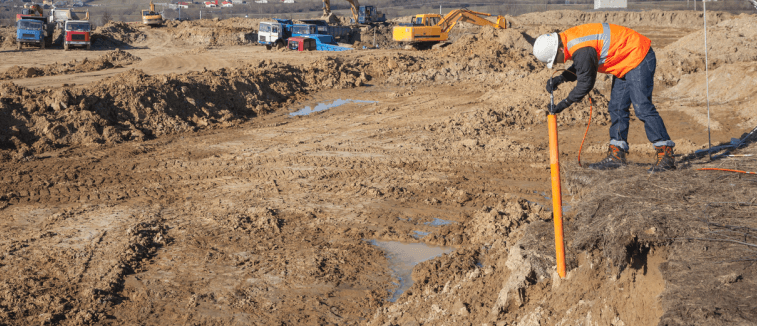Geotheta Can Be Fun For Anyone
Geotheta Can Be Fun For Anyone
Blog Article
Some Known Facts About Geotheta.
Table of ContentsThe 45-Second Trick For GeothetaAn Unbiased View of GeothetaAll about GeothetaRumored Buzz on GeothetaLittle Known Questions About Geotheta.

They conduct site investigations, accumulate samples, carry out lab examinations, and examine information to assess the suitability of the ground for construction tasks - Consulting Engineer. Based on their searchings for, geotechnical engineers provide suggestions for foundation layout, incline security, retaining structures, and reduction of geotechnical risks. They team up with various other experts, such as designers, structural engineers, and construction teams, to ensure that geotechnical factors to consider are incorporated right into the general job style and execution
By evaluating the behavior and buildings of dirt and rock, they can determine potential geotechnical threats such as landslides, dirt negotiation, or incline instability. Their knowledge assists stop failures or accidents that can threaten lives and residential or commercial property. Right here are some detailed duties and duties of a geotechnical designer: Site Investigation: Geotechnical designers conduct website investigations to gather information on subsurface problems.
They analyze the information to comprehend the homes and behavior of the dirt and rock, including their stamina, permeability, compaction qualities, and groundwater conditions. Geotechnical Analysis and Design: Geotechnical engineers analyze the information collected throughout website investigations to evaluate the security and viability of the site for building and construction jobs. They do geotechnical estimations and modeling to evaluate aspects such as birthing capability, settlement, incline security, side planet stress, and groundwater circulation.
Indicators on Geotheta You Need To Know
Foundation Layout: Geotechnical engineers play a vital role in making structures that can safely support the intended structure. They evaluate the soil conditions and tons needs to identify the suitable foundation kind, such as superficial structures (e.g., footings), deep foundations (e.g (https://www.imdb.com/user/ur185987626/?ref_=nv_usr_prof_2)., heaps), or specialized methods like soil enhancement. They take into consideration aspects such as negotiation restrictions, birthing capability, and soil-structure communication to develop optimum structure styles
They review construction strategies, screen website tasks, and carry out area assessments to verify that the layout referrals are adhered to. If unanticipated geotechnical problems arise, they assess the scenario and provide suggestions for removal or adjustments to the style. Risk Analysis and Mitigation: Geotechnical designers examine geotechnical dangers and threats associated with the job site, such as landslides, liquefaction, or dirt disintegration.

Partnership and Communication: Geotechnical designers work carefully with various other professionals involved in a task, such as designers, structural designers, and building and construction groups. Efficient interaction and partnership are important to incorporate geotechnical factors to consider right into the general job style and construction process. Geotechnical engineers offer technological knowledge, response inquiries, and ensure that geotechnical requirements are met.
Fascination About Geotheta
Here are some sorts of geotechnical designers: Structure Engineer: Structure designers concentrate on creating and evaluating foundations for frameworks. They analyze the soil conditions, tons demands, and site qualities to establish one of the most proper structure kind and layout, such as shallow structures, deep foundations, or specialized strategies like stack structures.
They examine the variables affecting slope security, such as soil buildings, groundwater conditions, and slope geometry, and create methods to stop slope failures and mitigate dangers. Earthquake Designer: Quake designers specialize in examining and creating frameworks to withstand seismic forces. They evaluate the seismic hazard of a site, examine dirt liquefaction possibility, and establish seismic layout criteria to ensure the safety and strength of structures throughout quakes.
They do area screening, accumulate examples, and analyze the gathered data to identify the dirt residential or commercial properties, geologic developments, and groundwater problems at a website. Geotechnical Instrumentation Engineer: Geotechnical instrumentation engineers concentrate on tracking and determining the actions of soil, rock, and structures. They mount and maintain instrumentation systems that keep track of factors such as soil settlement, groundwater degrees, incline activities, and architectural variations to analyze efficiency and supply very early cautions of possible problems.
Get This Report on Geotheta
They perform examinations such as triaxial tests, consolidation examinations, direct shear tests, and permeability tests to gather data for geotechnical evaluation and layout. Geosynthetics Engineer: Geosynthetics designers specialize in the style and application of geosynthetic products, such as geotextiles, geogrids, and geomembranes. They make use of these products to enhance dirt security, enhance inclines, give drainage options, and control erosion.
They tend to be investigatory individuals, which means they're intellectual, reflective, and inquisitive. They are curious, systematic, rational, logical, and sensible. Some of them are likewise social, suggesting they're kind, charitable, cooperative, person, caring, useful, understanding, skillful, and friendly - Geo Tech Engineer.
In the workplace environment, geotechnical engineers utilize specialized software application devices to execute calculations, develop designs, and examine data. They prepare reports, evaluation project specs, connect with clients and group members, and coordinate task tasks. The office setting offers a conducive atmosphere for study, analysis, and partnership with other specialists involved in the task.
Geotheta for Beginners
They regularly check look these up out project websites to conduct site investigations, assess geotechnical conditions, and gather information for evaluation. These visits involve traveling to various locations, sometimes in remote or difficult surfaces. Geotechnical designers might do soil tasting, conduct examinations, and monitor construction activities to guarantee that the geotechnical aspects of the job are being carried out appropriately.
Geotechnical engineers also operate in specialized geotechnical laboratories. In these facilities, they conduct experiments, perform examinations on dirt and rock examples, and examine the design residential properties of the materials. Geotechnical lab designers function extensively in these settings, taking care of testing equipment, operating tools, and tape-recording information. They work together with various other lab staff to guarantee exact and reputable screening results.
Report this page